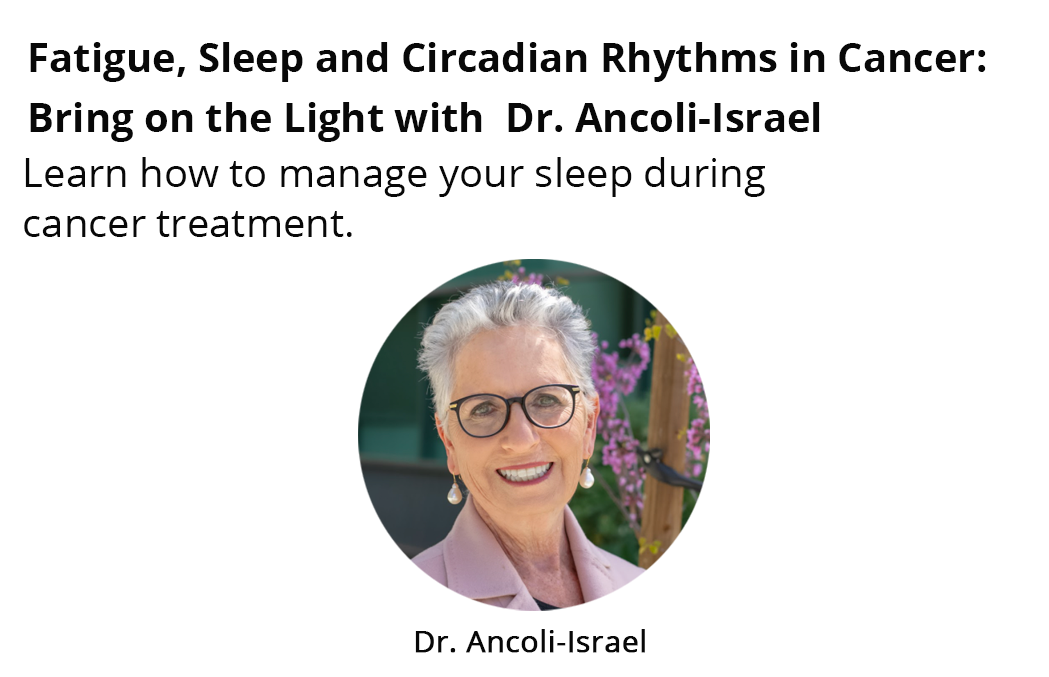Posted 11/2/2020
Dr. Sonia Ancoli-Israel Ph.D. is Professor Emeritus and Professor of Research in the Center of Circadian Biology at the University of California San Diego School of Medicine. In 2019, […]
Dr. Sonia Ancoli-Israel Ph.D. is Professor Emeritus and Professor of Research in the Center of Circadian Biology at the University of California San Diego School of Medicine. In 2019, the American Academy of Sleep Medicine awarded her the William C. Dement Academic Achievement Award.
She became interested in how chronic illnesses, specifically cancer, affect different aspects of sleep. She was specifically interested in the effect chemotherapy has on cancer-related fatigue, which is a serious problem faced by cancer patients throughout their treatment. In this talk, she describes her studies of the relationship between sleep, fatigue, and circadian rhythms in cancer patients as well as a potential treatment for cancer-related fatigue known as bright light therapy.
What is cancer-related fatigue?
Cancer-related fatigue is one of the most frequent complaints of cancer patients. It is so severe that it interferes with everyday functions and can be so extreme that it can cause cancer patients to stop their treatment.
There are many different factors that contribute to cancer-related fatigue including pain, anemia, depression, anxiety, social and cultural factors, and sleep circadian rhythms
Effect of chemotherapy on sleep quality
Dr. Ancoli-Israel performed a study which revealed that most patients had difficulty sleeping before their cancer diagnosis, but more than half of the patients felt that their sleep worsened once cancer treatment began.
She then did another study, the results of which show that a patient’s sleep period worsens as chemotherapy progresses, and the data revealed that patients are only asleep for 70% of the night.
In a third study, it was found that sleep quality, fatigue, and depression all got significantly worse during chemotherapy. These results suggest that targeting these specific symptoms before starting chemotherapy may benefit the patients once they begin treatment.
What are circadian rhythms?
Circadian rhythms are the natural internal processes sometimes called the “internal clock” that regulate many 24-hour cycles, including the sleep-wake cycle. Understanding the effects of chemotherapy on circadian rhythm is important because disrupted circadian rhythms have been shown to have negative side effects, such as increasing the risk of mortality in cancer patients.
Effect of chemotherapy on circadian rhythms
The results of various studies have shown that there is a significant decrease in rhythmicity in the first week of each cycle, but that the patients are able to recover in the following weeks of the first cycle. However, by the fourth cycle of treatment, patients were unable to return to their pre-chemotherapy levels of rhythmicity
These results suggest that that first cycle causes a temporary disruption of circadian rhythm while repeated administration of chemotherapy causes more enduring impairments to the rhythm.
What is bright light therapy?
Bright light is the strongest cue for the body’s circadian rhythm as it tells the body when to wake up and go to sleep. Bright light therapy is a treatment where patients are exposed to bright light in order to strengthen or restore circadian rhythms.
Relationship between light exposure and cancer-related fatigue
A study was done which revealed that women undergoing chemotherapy got significantly less exposure to light during the day throughout their treatment than they did before treatment, so Dr. Ancoli-Israel hypothesized that increased fatigue may result from less light exposure.
Effect of bright light therapy on cancer-related fatigue
A study was performed where breast cancer patients were given increased exposure to either bright red light or bright white light. This study found that fatigue of women with bright white light exposure did not worsen throughout their treatment.
This is not a cure for cancer-related fatigue, but it did keep fatigue at pre-chemotherapy levels. A similar effect was observed when studies were done on the effect that bright white light treatment has on circadian rhythm: circadian rhythms were able to return to pre-chemotherapy levels in every cycle of treatment.
Bright light therapy after chemotherapy
Many cancer patients experience “fogginess” which occurs with all different kinds of cancers and can last a year after treatment. A study was done that showed that bright light therapy after chemotherapy caused improvements in fatigue after the treatments were over.
